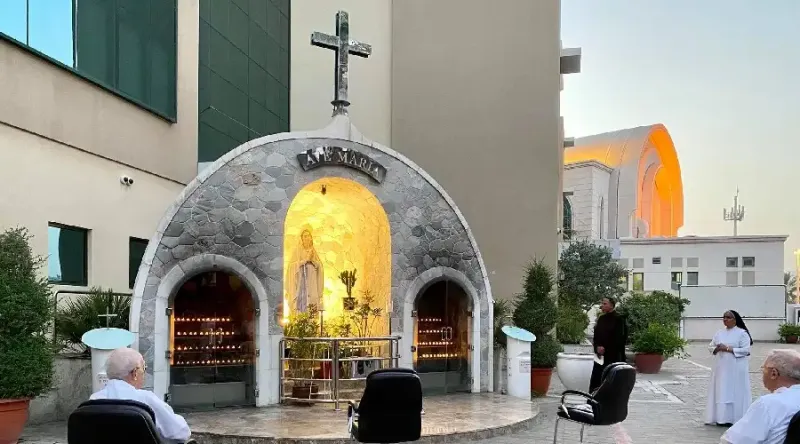 In the United Arab Emirates, a group of women will join other women from around the world on Dec. 8, 2022, to honor the Virgin Mary in the Worldwide Women’s Rosary. / Credit: Facebook page St.Joseph’s Cathedral Abu Dhabi AUH
In the United Arab Emirates, a group of women will join other women from around the world on Dec. 8, 2022, to honor the Virgin Mary in the Worldwide Women’s Rosary. / Credit: Facebook page St.Joseph’s Cathedral Abu Dhabi AUH
CNA Newsroom, Nov 22, 2022 / 12:00 pm (CNA).
Women from all over the world will join together Dec. 8 for the public recitation of a rosary to Our Lady. In the United Arab Emirates, where only 7% of the population professes Christianity, women are participating in the initiative in a special way.
Martha and Darío are a Colombian married couple living in Abu Dhabi, the capital of the United Arab Emirates. There they have developed an active faith life, and on Dec. 8 they will be part of a Catholic community that will join the Worldwide Women’s Rosary.
It was a job position for Darío that led him and his wife to move to the United Arab Emirates in 2008 and start their lives over, 8,000 miles from their native Colombia.
In an interview with ACI Prensa, CNA’s Spanish-language sister news agency, Darío said that during their first few years of living there they attended the celebration of the Eucharist in English at St. Joseph Cathedral in Abu Dhabi. An announcement during Mass led them to meet a group of Spanish-speaking people who were attending Mass in Spanish.
Some time later, Martha was asked to be in charge of coordinating the Mass, and with the help of her husband, who had experience in the life of the Church in Colombia, she undertook the task, joined by one of her friends.
Darío approached the then pastor of the cathedral to offer his help. From that moment on, he began working as a coordinator for the Spanish-speaking community.
Thus “began the activities aimed at the formation of a community, of a Spanish-speaking Catholic Church, in the midst of a parish that has countless different languages and cultures congregated in the same place,” he recalled.
The tasks followed one another: community outreach, locating rooms for catechesis, preparation of the Mass and soon there were some 220 families from countries such as Venezuela, Colombia, Mexico, Ecuador, Peru, Bolivia, Chile, Argentina, Panama, and Spain.
The Catholic faith in the United Arab Emirates
Abu Dhabi belongs to the South Vicariate of the United Arab Emirates, a country where the official and most widespread religion among its inhabitants is Islam, at 75% of the population, and approximately 7% professing Christianity.
“It’s common to think that in a place where the Catholic faith is not the main recognized faith, different kinds of difficulties may arise,” Darío acknowledged.
“Here, on the contrary, we constantly receive ‘friendly challenges’ to faithfully demonstrate our faith to others in love, in charity, in respect, in tolerance,” he said.
The official language of the vicariate is English, but at St. Joseph Cathedral, Mass is offered in Spanish once a month.
The same is true of the Arab, Filipino, Sri Lankan, and Indian communities (in their different language groups), as well as small German-, French-, and Italian-speaking communities.
As for education in the faith, unlike in Latin America, catechesis is not directed toward sacramental preparation, but during the 12 years of primary and secondary school, catechesis is given on weekends as an extracurricular activity.
In the Spanish-speaking community, there is also catechesis for families whose children will receive the sacraments in their country of origin. “At the same time, parents receive their faith formation,” Darío explained.
Their connection to the rosary
At Martha’s initiative, since they arrived in Abu Dhabi, she and her husband began to pray the Pilgrim Holy Rosary in the homes of different people. Later, it was transferred to the cathedral, where a group of women met once a week.
At the beginning of the pandemic, the practice had to be suspended, and it hasn’t been possible to restart it because normal activities in the country only resumed two weeks ago.
The news about the Worldwide Women’s Rosary came through Fanny Tagle, a Chilean who participates in coordinating the initiative and who was a classmate of Darío’s in a professional development course. And so Tagle conveyed the proposal to him.
Martha and Darío took the idea to the parish, where the priest decided to support it, proposing to offer the intentions of the rosaries that are said in the half hour before each Mass from Dec. 5–8 for the Worldwide Women’s Rosary.
In the entire country, which is about the size of the state of Maine, there are only nine Catholic parishes, which means that “people of different cultures and different countries flock to the eucharistic celebrations.” Darío estimates that every Sunday some 15,000 people attend Mass.
On liturgical solemnities such as the Immaculate Conception on Dec. 8, it’s not possible to hold any activity outside of Mass, and the rosary cannot be prayed in the church.
During the month of October, the Catholic community of the United Arab Emirates celebrates the devotion to the holy rosary. A heavily attended rosary service is held to close the month’s events, and this year it brought together close to 1,300 people. It was the first one to be led by the new bishop of the vicariate, Paolo Martinelli.
To join the global initiative Dec. 8, the couple is considering meeting in a house and livestreaming it from there on the Facebook page of the Spanish-speaking community of Abu Dhabi.
Representatives from Argentina, Australia, Bolivia, Brazil, Canada, Chile, Colombia, Costa Rica, Ecuador, El Salvador, Spain, and the United States have already confirmed their participation in the Worldwide Women’s Rosary.
Also participating will be women from Guatemala, Honduras, Italy, Mexico, Nicaragua, Panama, Paraguay, Peru, Puerto Rico, the Dominican Republic, Uganda, Uruguay, and Venezuela.
This story was first published by ACI Prensa, CNA’s Spanish-language news partner. It has been translated and adapted by CNA.
[…]







Some consider it the religion of peace! Others view it as a typical man made religion.
We worship the Prince of Peace.
Matthew 10:28 And do not fear those who kill the body but cannot kill the soul. Rather fear him who can destroy both soul and body in hell.
This happens when Muslims are only 14 per cent of the population of Uganda.
Uganda would commit no injustice if it were to outlaw Islam altogether.
The BBC news report on this incident ever so carefully avoided mentioning that it happened at a Catholic church although they did quote a priest’s statement. The violence was, of course, attributed to economic causes.
But a UPI story on the incident mentioned “Islamic” group and “Catholic Church” in the lede paragraph. Interesting contrast, eh what?
When Islam conquers, other faiths are crushed. The Reconquista in Iberia is one of the very few exceptions but look for that victory to be reversed in another generation or so.
Someone once said that BBC stands for “Broadcasting Before Confirming. ”
The BBC’s slant just keeps getting more ridiculous and the reporting more selective.
This has been going on for centuries. All these areas were once majority Christian: Egypt (90% Copts until the religion of peace came in the seventh century); Israel, Lebanon, the Palestinian territory, Syria (where Christians were first called Christians!), Anatolia (today’s Turkey), North Africa (the land of Tertullian and St. Cyprian of Carthage, St. Athanasius of Alexandria and St. Augustine of Hippo!)…there were even Christian (and Jewish) enclaves in Arabia. Then came the religion of peace in the seventh century and in a century turned all these places into religion of peace majority. In Egypt alone, Christian now make up less than 10% and continue to be persecuted and d oppressed). Europe will be next in a few decades just from demographics. See below historian R. Ibrahim account of the persecution of Christians just in the last few decades. Lamentably, neither most of the media nor even CWR mention all of these:
‘We Were Commanded [by Allah] to Kill You!’ The Muslim Persecution of Christians, June 2025
https://www.raymondibrahim.com/2025/07/28/we-were-commanded-by-allah-to-kill-you-the-muslim-persecution-of-christians-june-2025/
This is what you get when you get into bed with Muslims. Sorry, but they commit barbaric acts. What’s so disappointing is we have a hierarchy that bends over backwards to placate barbarism. Guess what the result of that is.
Islam is a religion/political movement of conquest.
We need to get that straight, preferably sooner rather than later.